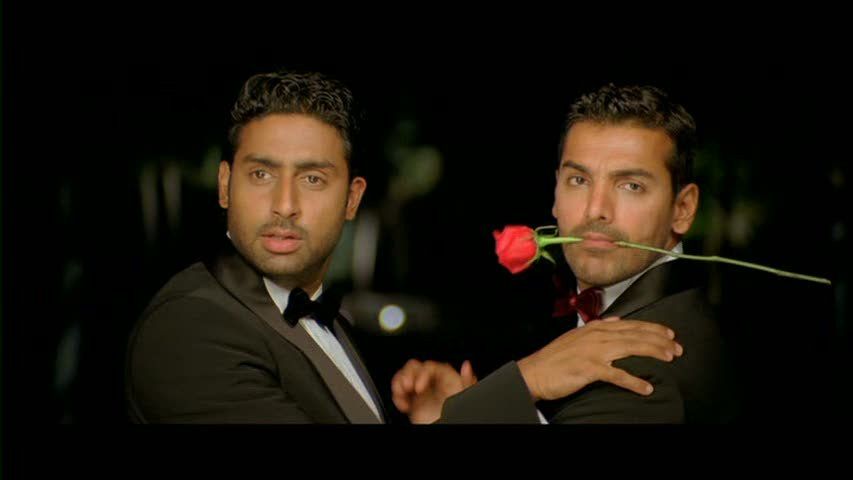How Bollywood Has Upheld Section 377 Through Its Movies

The Indian movie industry today is undergoing a revolution never seen before as we see movies like Toilet and Padman making a splash at the box office, with directors willing to venture into uncharted waters on topics considered a taboo, and risqué for commercial cinema. Mix that with an industry geared towards big romantic gestures and sex, and everything in between, and the result is an exploration, albeit often shallow, of the lives of the homosexual community, which were thus far relegated to an instrument to provide comic relief.
Source: Pinterest
The mainstream Bollywood cinema since the release of Deepa Mehta’s ‘Fire’ in 1996, a movie based off of Ismat Chugtai’s short story ‘Lihaaf’ infamous for the uproar it caused for it allegedly explicit homosexual content, has mostly dealt with this by resorting to relegate homosexual characters to provide comic relief. For instance, 2003 movie ‘Kal Ho Na’ is replete with humour at the expense of this community.
Source: Pinterest
However, it was also With Karan Johar’s 2008 movie Dostana, the Bollywood industry for the first time saw a movie dealing openly with homosexuality, and though this movie also is abounding in stereotypes, it would be difficult to renounce its claim of bringing “conversation of homosexuality into the drawing room of every urban home” as the filmmaker said. With a big banner production house backing this very commercial movie, the topic was thrown into limelight. Then there are movies like ‘Girlfriend’ which plays on the purely physical angle of homosexual relationship, again to the stereotypical presentation of almost debauched carnal relationship.
Source: BuzzFeed
It was Shonali Bose’s ‘Margarita with a Straw’ in 2014 which started the conversation in the way it ought to have been with Kalki Koechlin’s brilliant portrayal of a teenager riddled with cerebral palsy confused about her sexual identity, attracted to both the genders, as she struggles not only with her own sexual identity but also for acceptance from her own mother. It is a story of self-discovery, sprinkled with incidents of romance with a skill heretofore unseen in an Indian movie concerning a homosexual love angle. As opposed to this movie which is proliferating in the unusual, and rigidly opposed to the formulaic Bollywood romance, Sudhanshu Saria’s ‘Loev’ is a movie rich in all the passions of what typically encompasses a heterosexual romantic movie with its themes of unrequited love, jealousy and, a love triangle.
Source: Yeh Ishq Nahin Aasaan
What is astonishing is that even when these pathbreaking movies were receiving raving reviews from the critics, Ramchandra Siras, a professor teaching Marathi at the prestigious Aligarh Muslim University was caught in life-changing, catastrophic scandal which would eventually cause him his life , and this wretched incident was faithfully recorded on the screen in Hansal Mehta’s 2016 movie ‘Aligarh’. Manoj Bajpayee played the protagonist’s role with utmost sincerity, throwing to light the plight of this community, and the utter sense of displacement they feel even in their own country, picturized beautifully in the scene when Bajpayee ruefully comments, “ Dekh mei yaha bahar ka aadmi samjha jata hu, an outsider… shaadi shuda logo ke beech ekela rehta hu.”
Source: etc.In
It was also in 2016, that Karan Johar’s iconic movie, ‘Kapoors and Sons’ , a movie in which representation of the homosexual community was diametrically different from his previous movies, as in this movie the stereotype of gay men being intrinsically feminine is subverted with Fawad Khan playing a gay character who is parading as a straight man, a deception he is easily able to carry off due to his so-called masculine personality traits. The trauma of hiding a relationship and the enormous strain that puts on the familial relationships, and the extreme sense of isolation which lack of acceptance by closed ones leads to is illustrated with such poignancy that it moves even those staunchly opposed to such relationships to pity if not acceptance.
Source: BookMyShow
Shashanka Ghosh’s ‘Veere di Wedding ‘ a movie challenging norms at every second, from scenes of female masturbation to one night stands, the movie portrayed a healthy homosexual relationship between Sonam Kapoor ’s uncle Cookie, played by Vivek Mushran and Sukesh Arora as Keshav, Cookie's boyfriend.
Source: GramUnion
‘Padmaavati’ was another 2018 movie which portrayed homosexuality albeit in a much subtler manner. The movie shows, Ranveer Singh as Sultan Alauddin Khilji, a man in a position of authoritarian power having bisexual leanings towards his slave-general Malik Kafur. This is important as it signifies the existence and normalcy of homosexuality even in 13th century. There is an undercurrent of a sexual relationship between the two in the entire movie, and though there is no climax as such to this, no fulfillment of Malik Kafur’s longing. However, this very ambiguous presentation of such a relationship gives us hope that greater, more radical change will arrive in Bollywood, which breaks free from the chains of cliched presentation of the homosexual community as a means of providing comic relief.
The unbreakable bond between India’s society and the movie industry cannot be stressed enough. Ours is a country where Rajnikanth is literally worshipped, kids imitate Salman Khans of our times, and men and women want their love life to imitate a Karan Johar movie, and it is about time that the homosexual community gets a proper representation free of the stereotypes which has their reel life, to get the acceptance in their real life.






